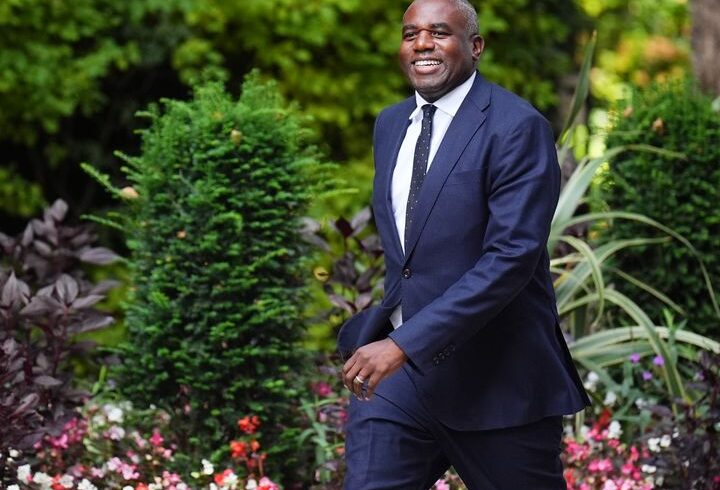
Here is a list of the new appointments announced by Downing Street on Friday.
– David Lammy, Deputy Prime Minister and Justice Secretary
Born in Tottenham to Guyanese parents, David Lammy entered Parliament in 2000 after studying at Harvard and served as a junior minister under Tony Blair and Gordon Brown.
In opposition, he was credited with helping Sir Keir Starmer establish relationships with foreign leaders, and as foreign secretary made use of his friendship with US vice president JD Vance to open doors in Washington, despite his previous strong criticism of Donald Trump.
But he has a long-standing interest in justice, having been a lawyer before his election and in 2017 carried out an independent review for the then-Tory government on the treatment of ethnic minorities by the criminal justice system.
– Yvette Cooper – Foreign Secretary
Yvette Cooper is one of the most experienced members of Sir Keir’s Cabinet, having been first elected in 1997 and serving as chief secretary to the Treasury and work and pensions secretary under Gordon Brown.
She later served as shadow home secretary under both Ed Miliband and Sir Keir, before taking over the Home Office last year, where she spearheaded the Government’s efforts to reduce small boat crossings.
That role has seen her engage with foreign ministers, particularly the French, as part of negotiations on co-operation against people smuggling, though this is her first major foreign affairs job apart from a brief stint as shadow foreign secretary under Mr Miliband.
– Shabana Mahmood – Home Secretary
A barrister and one of the first Muslim women elected to Parliament, Shabana Mahmood has been a key ally of the Prime Minister, who made her the party’s national campaign co-ordinator in opposition after its disastrous performance in the 2021 local elections.
From there, she became shadow justice secretary and then justice secretary, responsible for reducing the length of time some offenders served behind bars in a bid to tackle a prison overcrowding crisis.
Described by one of her parliamentary colleagues as “ruthless”, she is expected to follow a tough line at the Home Office and has already described the UK’s interpretation of the European Convention on Human Rights as “maximalist”.
– Darren Jones – Chancellor of the Duchy of Lancaster and Chief Secretary to the Prime Minister
Seen as a rising star in the party, Darren Jones came to prominence grilling business leaders as chairman of a Commons committee before he was brought into Sir Keir’s Treasury team.
His appointment comes only four days after he was moved into a newly-created role in Number 10 overseeing efforts to drive Sir Keir’s agenda forward across Whitehall – a sign of the Prime Minister’s confidence in him.
That role is set to continue in his new job, but questions will remain about how the role of Prime Minister’s chief secretary will operate.
– Steve Reed – Housing, Communities and Local Government Secretary
Friday’s reshuffle represents a return to local government for Steve Reed, who spent six years as leader of Lambeth Council, turning it around after it was rated the worst-performing in London.
Seen as a tough politician unafraid of a fight, Mr Reed has been closely associated with Downing Street chief of staff Morgan McSweeney after the pair worked together in Lambeth.
– Pat McFadden – Work and Pensions Secretary
Sir Keir Starmer’s fixer, Pat McFadden was one of the key figures behind Labour’s 2024 general election win and has been one of the Prime Minister’s closest advisers in office.
He is also a well-experienced political operator, having been an MP since 2005 and serving in ministerial roles under Tony Blair and Gordon Brown.
His move to a new “super ministry” is both a mark of the Prime Minister’s confidence in him and a potential sign that the Government intends to push ahead with some radical welfare reform as it strives to achieve the economic growth it has promised.
– Peter Kyle – Business and Trade Secretary
Peter Kyle left school with few qualifications after being diagnosed with dyslexia, but aged 25 secured a place at university and was eventually awarded a PhD before becoming an aid worker.
As Science Secretary, he was responsible for AI policy – one of the Government’s top priorities – but also caused controversy when he accused Nigel Farage of being on the same side as “sex offenders like Jimmy Savile” over Reform UK’s opposition to the Online Safety Act.
– Liz Kendall – Science, Innovation and Technology Secretary
Elected in 2010 and regarded as a Blairite, Liz Kendall mounted a challenge for the Labour leadership in 2015, pitching herself as the “modernising candidate”.
But after coming fourth, she spent most of the next five years on the back benches before being brought back onto the front bench by Sir Keir.
Her tenure as work and pensions secretary was marked by contentious attempts to force through changes to welfare payments that eventually saw the Government U-turn in the face of backbench opposition.
– Emma Reynolds – Environment, Food and Rural Affairs Secretary
Emma Reynolds has enjoyed a rapid rise up the ministerial ranks since her re-election in 2024, being brought straight into the Treasury team as pensions minister, then City minister and now Environment Secretary.
She is one of a number of MPs who returned to the Commons last year after losing their seat in 2019 – she had been first elected in 2010 – during which time she worked as a lobbyist for the financial sector.
– Douglas Alexander – Scotland Secretary
Another “retread”, Douglas Alexander was an MP between 1997 and 2015, before he was defeated by the SNP’s Mhairi Black, then the youngest MP elected since 1832.
In that time, he served as Labour’s election co-ordinator in 2010, preparing Gordon Brown for the UK’s first televised leaders’ debates, and then ran Ed Miliband’s election strategy team in 2015.
A Cabinet minister under Tony Blair and Gordon Brown, he was fast-tracked back into the ministerial ranks by Sir Keir last year, and has now returned to the Cabinet table.
– Jonathan Reynolds – Chief Whip
As business and trade secretary, Jonathan Reynolds oversaw some of the Government’s most significant actions in its first year in office.
These include the effective nationalisation of British Steel and trade negotiations with India and the US, which saw him speak directly to American commerce secretary Howard Lutnick while battling poor mobile signal on a drive back to his Stalybridge constituency.
But he was also forced to apologise after it emerged he had repeatedly described himself as a solicitor despite never qualifying as one.
– Sir Alan Campbell – Leader of the House of Commons
An MP since 1997, Sir Alan Campbell had vast experience in the whips office, having been Labour’s deputy chief whip and then chief whip since 2010.
In that role, he had to manage an often fractious party – a job that included most recently suspending the whip from four MPs deemed to have caused persistent problems for the leadership.





